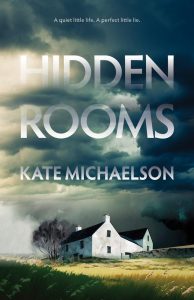Author channels her Lyme experiences into a mystery novel

By Kate Michaelson
I’ve always loved mysteries, but I learned in 2009 that living through my own medical mystery was a million times less appealing than reading about one in a book.
That was the year I was suddenly hit with extreme fatigue, neck pain, daily headaches, and muscle weakness. A few months later, disabling vertigo and dizziness set in. Then came a cascade of too many symptoms to name.
The next several years passed in a blur. I visited at least twenty different doctors and underwent what felt like every test imaginable, only to be referred to still more doctors for more tests.
In some cases, I was told that since the tests didn’t show anything, nothing was actually wrong with me, even though I was too sick to work or do much of anything by that point.
Eventually, through a combination of research and advice from my sister, I found a diagnosis: Lyme disease and dysautonomia. While I was able to find medication for dysautonomia—an autonomic nervous system disorder that can result from Lyme—every doctor had a different opinion on how to treat Lyme and my co-infections.
That was when I realized that finding a diagnosis was just the beginning of this journey. Once again, I set about researching—feeling as if I had solved one mystery only to be faced with a new one.
Frustratingly familiar
To those of you who have Lyme or care for someone who does, I’m sure all of this sounds frustratingly familiar. Because I was confined to my couch for much of this time, I read a lot, and although I enjoyed the escapism of books, I felt somewhat separate from all the able-bodied, healthy characters.

At the same time, I identified with the detectives in the mysteries I read. After all, I’d been thrust into the role of medical detective. Because there’s little to no consensus on Lyme in the medical community, we’re often forced to scour websites and articles in an attempt to solve our own medical mysteries.
It was then that I had the idea to write a mystery where the main character is also struggling with a poorly understood illness. My hope was to write an engaging page-turner that also showed what life is like for those of us on this journey.
The resulting book, Hidden Rooms, follows Riley, a distance runner, who begins experiencing bewildering symptoms but can’t find a diagnosis. Meanwhile, Riley gets thrust into the center of a murder investigation involving her family.
A sense of purpose
I probably don’t need to tell you that writing a book with the brain fog and chronic pain of Lyme disease presented a challenge. At the same time, the project gave me a sense of purpose when I woke up every day.
When neck pain wouldn’t allow me to sit at a computer, I used voice dictation to write. I proofread on my phone while lying down. On days when brain fog kept me from writing even a sentence, I tried to do other things, like outline ideas, flesh out characters, or draw a map of my setting.
As I wrote my mystery, I realized I would have to make some compromises. After all, I couldn’t fill hundreds of pages with Riley lying on the couch with debilitating vertigo, which was the reality of my illness at its worst. Riley’s actions had to move the plot forward and drive the investigation, but the truth of chronic illness is that often people don’t have the energy to do the most basic tasks of everyday life—let alone solve a murder.
To balance these challenges, I tried to depict how Riley could rally herself to certain situations but would crash afterwards. People with chronic illnesses know all too well the post-exertional malaise that hits after we push ourselves. Beyond the physical toll, I focused on the psychology of this experience by showing Riley’s self-doubt, loneliness, and frustration in having an unknown illness and not always being believed.
Was the reality of Lyme “too depressing”?
After a steep learning curve on fiction-writing and many rounds of revision, I had a book. But would anyone want to publish a novel about a chronically ill protagonist? I submitted Hidden Rooms to almost thirty agents and editors, some of whom were interested in the idea of a woman struggling to find answers to a mysterious ailment. Meanwhile, others told me the subject matter was just “too depressing.”
One agent informed me that he had carpal tunnel, but he didn’t see the need to write a book about it. Another editor told me that I could only write about illness if I used it as a metaphor for something else. However, one February day in 2023, the owner of a small press called with the news that she wanted to publish Hidden Rooms—not only as a print and e-book but as an audiobook as well. (I’ll let you imagine the awkward happy dance that ensued.)
As a member of the chronic illness and Lyme community, I’m so grateful to have reached this point and proud to have written a book about the struggles we face. Of course, we all know that finding a diagnosis is just the beginning, so I’m now working on a sequel that focuses on the aftermath of Riley’s diagnosis and her search for the right course of treatment.
I hope when people read my book, they feel like a bit of what they have been through has been validated. Beyond that, I hope they also get carried away with the mystery, the characters, and the world in which they live. After all, those of us with Lyme deserve some fun! I know that no single character or book can capture the breadth and depth of what individuals with Lyme disease face on a daily basis, but I hope Hidden Rooms helps to shine a little light on our lives.
Kate Michaelson lives in Ohio. Her website is katemichaelsonwriter.com.
(Note from LymeDisease.org’s Dorothy Leland: I thoroughly enjoyed Hidden Rooms! It was a compelling mystery on two levels. First, who killed the bride? And second, what was the root of Riley’s bizarre health problems–and why was her doctor so dismissive about it? I strongly suspected the answer to mystery number two, but the solution of the murder mystery was a complete surprise! Highly recommend.)




















We invite you to comment on our Facebook page.
Visit LymeDisease.org Facebook Page